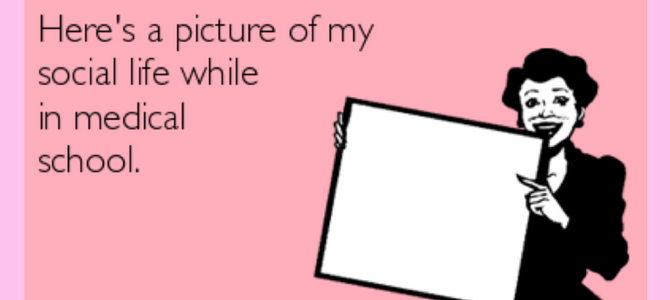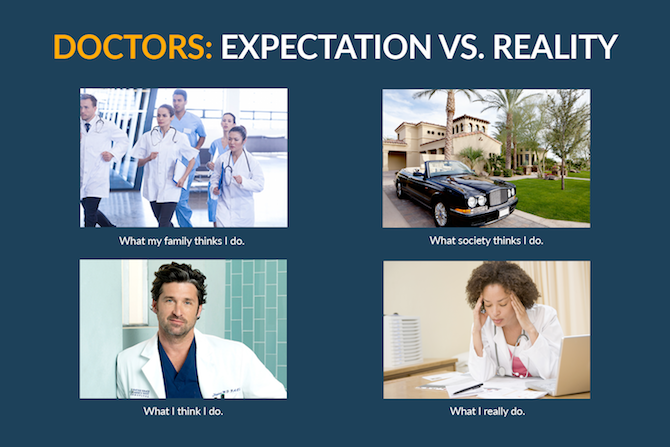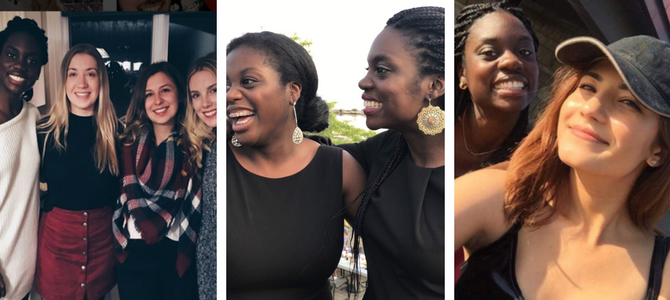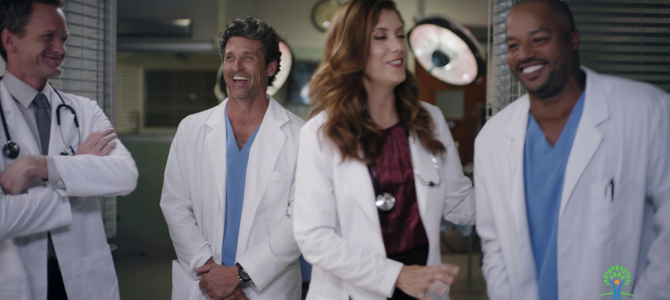Think you know what life is like in medical school? Think again. Oluwabunmi, our Canadian Ambassadorm busts some common med school myths…
As a medical student I can honestly say that studying medicine is a dream come true. Every time I learn a new set of symptoms or practice a clinical skill I feel that much closer to my goal of becoming a doctor. However I must admit that I did have a few expectations about school. Sometimes my expectations were well warranted and other times I couldn’t have been more wrong if I’d tried. Below are my hits and misses throughout medical school so far…
Expectation: You will be studying ALL the time
Reality: You will be studying all the time, but at varying levels of intensity

Note that this is an exaggeration (most of the time)
I won’t lie to you, the truth is medical school is academically rigorous, and a student must be able to navigate mass amounts of information in significantly less time than required. In order to do this they must study very regularly. And there will be instances where books own you and you breathe, eat and sleep and microbiology pathophysiology, when all of your jokes revolve around medical terminology and when you put aside various hygiene practices and eat only meals that have been delivered or pre-made and frozen. This is usually during exams. But with the storm comes the rainbow, there will be times when there are no books in sight, when Netflix will ask you “Are you sure you want to continue watching?”, when you don’t know what *insert medical term that you surely heave heard before here* means but you won’t care. This is normally during holidays and lulls in the semester. In between these two extremes is the everyday grind of constant reading and memorising which is what I signed up for so I’m really in no position to complain.
Expectation: You’ll know right away what type of medicine you’d like to specialise in
Reality: You are going to change your mind, or at least go back and forth between numerous options and that is completely okay
 Walking into medical school with a rigid mindset concerning your specialty can prevent you from missing out on so many experiences and opportunities. Medical school will expose you to a lot of different specialties that will open your mind and make you see things differently. It will help you rule out the specialties that you will not at all enjoy (hey, one man’s trash is another man’s treasure right?) and reveal others that you may love but had never considered. I knew going into medical school that I loved obstetrics and gynaecology. The prospect of delivering babies, working with families, remedying infertility – all of it appealed to me. And then I arrived at RCSI and started flirting with the idea of psychiatry (completely different I know) and neonatology because of the all of the talks, conferences, lectures, publications and professionals at my disposal. You will also be able to see how professionals combine their passions into their own specialty through teaching, patient care and research.
Walking into medical school with a rigid mindset concerning your specialty can prevent you from missing out on so many experiences and opportunities. Medical school will expose you to a lot of different specialties that will open your mind and make you see things differently. It will help you rule out the specialties that you will not at all enjoy (hey, one man’s trash is another man’s treasure right?) and reveal others that you may love but had never considered. I knew going into medical school that I loved obstetrics and gynaecology. The prospect of delivering babies, working with families, remedying infertility – all of it appealed to me. And then I arrived at RCSI and started flirting with the idea of psychiatry (completely different I know) and neonatology because of the all of the talks, conferences, lectures, publications and professionals at my disposal. You will also be able to see how professionals combine their passions into their own specialty through teaching, patient care and research.
Expectation: You will be achieving the same marks you had before medical school
Reality: This may not always be the case
 This goes back to my first expectation. There is a lot to know and A+ papers will be hard to come by. A doctor must understand how the body first functions normally, then full details of the disease process and its effects. In my experience studying during my undergraduate program was different because I was studying to regurgitate on an exam rather than to retain. Studying to retain takes longer and requires more effort and upkeep. While being book smart has fantastic advantages, especially during the non clinical portion of medical school, being a doctor is more than what you circled during your multiple choice quiz and scribbled down for your short answer. It’s how you can communicate what you know and understand to fellow colleagues, patients and their families. So while you may not have gotten 90% on your biochemistry exam because you missed more than a few points here and there, your understanding of the biochemical process behind diabetes can directly translate to your understanding of its clinical presentation so that you can spot it early in a patient.
This goes back to my first expectation. There is a lot to know and A+ papers will be hard to come by. A doctor must understand how the body first functions normally, then full details of the disease process and its effects. In my experience studying during my undergraduate program was different because I was studying to regurgitate on an exam rather than to retain. Studying to retain takes longer and requires more effort and upkeep. While being book smart has fantastic advantages, especially during the non clinical portion of medical school, being a doctor is more than what you circled during your multiple choice quiz and scribbled down for your short answer. It’s how you can communicate what you know and understand to fellow colleagues, patients and their families. So while you may not have gotten 90% on your biochemistry exam because you missed more than a few points here and there, your understanding of the biochemical process behind diabetes can directly translate to your understanding of its clinical presentation so that you can spot it early in a patient.
Expectation: Medical school causes a strain on relationships outside of school
Reality: Relationships whether inside or outside of school involve effort in order for them to grow and stay healthy

Pictured here are a few of my Canadian best friends. They listen to my highs and lows and although we may not talk as frequently as we used to, when we do nothing has changed (I should have more photos really, but everyone that knows me knows that I’m not the best at capturing “moments”). Also pictured…Me and my amazing sister. She’s very supportive and always has something hilarious to say to bring me down from 100.
I have made amazing friends in medical school who have seen me at my best when I’m high on life, hopping around (literally) and making jokes for days, but they have also seen me at my very worst when I am too stressed to function and studying holed up in my room only resurfacing to eat at odd hours. This happens naturally, these people are in the thick of it with you and understand exactly what you’re going through because they’re going through the same thing. This doesn’t mean that relationships outside of school should suffer. I would be lying if I said that my friendships outside of school haven’t changed – they have but it’s not for worse. Now we carve out time for each other, and we value this time so much more. Some students find it difficult to communicate the highs and lows of school with non medical students because of the differences in subject. While this is understandable, this is exactly what friends and family are for. They are there to listen to you rant and rave about the exam you failed and your exciting new research position. Just because they don’t know the function of the drug you’re trying to pioneer or that the you got a particularly difficult examiner doesn’t mean they can’t sympathize and shout along with you. Make time for them, there’s more to life than school. They deserve it and so do you.
Expectation: You will have all the knowledge and be diagnosing patients left and right just like on TV
Reality: This is so entirely false I don’t even know where to start
 TV in most cases is a much cleaner story than in reality. On TV patients come in with defined symptoms and the doctors just know what to do, there are a couple close calls and dramatic moments and everyone is okay at the end. In reality patients present with everything under the sun and often the same disease looks completely different in two people. Doctors may consider several diagnoses especially if they work in a team and a successful outcome depends on who you ask. The TV doesn’t show the studying and the exams because that’s not “sexy”.
TV in most cases is a much cleaner story than in reality. On TV patients come in with defined symptoms and the doctors just know what to do, there are a couple close calls and dramatic moments and everyone is okay at the end. In reality patients present with everything under the sun and often the same disease looks completely different in two people. Doctors may consider several diagnoses especially if they work in a team and a successful outcome depends on who you ask. The TV doesn’t show the studying and the exams because that’s not “sexy”.
I’d say I scored a solid 1/5 based on how many of my theories were actually correct. 20% is a dismal mark I know, but the past two years have taught me valuable lessons that this 20% fails to portray. I was surprised but very grateful for the vast majority of my theories to be disproved over and over again. With three years remaining I can safely say I’m looking forward to several more *graceful* misses.
Interested in exploring your options for medicine in Ireland? Visit the RCSI website.

